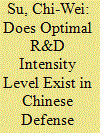| Srl | Item |
| 1 |
ID:
177830


|
|
|
|
|
| Summary/Abstract |
This paper investigates whether there exists an optimal level of research and development (R&D) intensity, at which defense enterprises are able to maximize their market performance. The Panel Threshold Regression Model was applied to probe the link between R&D intensity and sales growth for defense listed enterprises, in China. The empirical results indicate that the Law of Gibrat does not hold and, unlimited input in R&D, does not guarantee positive paybacks. This may lead to the assumption that there is an optimal R&D intensity level in Chinese defense enterprises. Due to the fact that the defense industry has broken entrance barriers and considering the introduction of social capital into R&D activities, managers and top management should set more specific guidelines and provisional benchmarks to ensure effective R&D resource allocation in order to achieve maximum performance.
|
|
|
|
|
|
|
|
|
|
|
|
|
|
|
|
| 2 |
ID:
181445


|
|
|
|
|
| Summary/Abstract |
For the purpose of this research, we use the rolling window method in order to examine the relationship between global geopolitics risks and renewable energy. The results display a two-way causality between geopolitics risks and renewable energy that are spread across various sub-samples. This shows that geopolitical risks play an important role in the advent of renewable energy primarily because of the energy security, rare metal competition, and trade disputes that are put forth, which stimulate the transition to renewable energy. On the other hand, renewable energy has a significant impact on geopolitical risks that are driven by global economic growth, rising fossil fuels prices and technological innovations. The findings also support the classical production model, which reveals that geopolitical risks and renewable energy have a mutual relationship with one another. Further in this regard, renewable energy is capable of accommodating new powers in the international political system. This aspect is more useful for international peace, and may also reduce geopolitical risks. Therefore, the transition to renewable energy is beneficial to the energy supply and security. Therefore, the governments of the world should encourage the private sector to participate in renewable energy projects, by providing special incentives for this purpose.
|
|
|
|
|
|
|
|
|
|
|
|
|
|
|
|